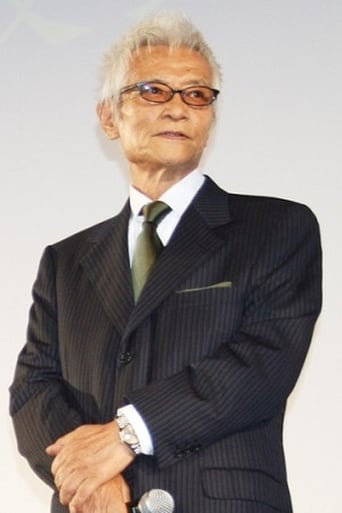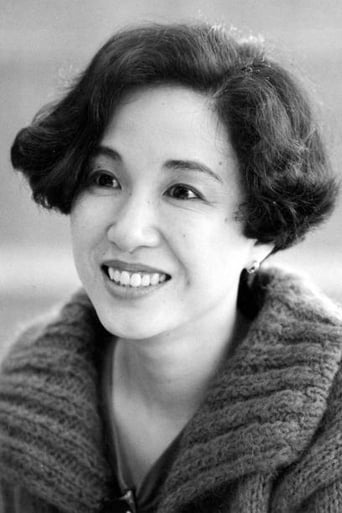Softwing
Most undeservingly overhyped movie of all time??
AshUnow
This is a small, humorous movie in some ways, but it has a huge heart. What a nice experience.
Phillida
Let me be very fair here, this is not the best movie in my opinion. But, this movie is fun, it has purpose and is very enjoyable to watch.
Darin
One of the film's great tricks is that, for a time, you think it will go down a rabbit hole of unrealistic glorification.
WILLIAM FLANIGAN
Viewed on DVD. Restoration = ten (10) stars; calligraphy = eight (8) stars; subtitles/translation = three (3) stars. Director Peter Greenaway delivers a one trick pony of nudity and calligraphy with bolt-on snippets from a famous historical document. Photographing the lead actress and actor in full front, back, and side nudity covered with great to nearly-great Japanese writing may be a bit shocking (and a major attraction for voyeurs) the first time around, but rapidly becomes boring, as the Director seems to have no place to go from there (and his actors certainly have no more anatomy to expose) except to do this over and over again. Greenaway tries to inject some energy into an under nourished production with jump-cut editing (he is also credited as being an editor), adding random shots (that may contain unexplained symbols?), and all manner of split screens and sub-screen inserts (mostly by re-using and re-using shots). The Director's feeble attempt to link his film to Shi Shounagon's (Shi Nagiko's?) diary that has miraculously survived (with translator/copier embellishments/mistakes) from the turn of the 11th Century is patently contrived (and particularly hilarious if you have read MAKURA NO SOUSHI ("notes of a pillow")!). The plot calls for the female protagonist to write about a dozen books and deliver same to a debauched publisher. Since each "book" is written on all or part of a single male's body (two bodies are used to deliver one of the "books"), it would seem that insufficient male anatomy exists for more than a page or two without employing a small army of nude male couriers. (Perhaps a more apt film title might be "The Pillow Pamphlet"!) Acting is okay. Cinematography (narrow to semi-wide screen, color) is fine except for some tiny window inserts. Subtitles and translations are pretty much a disaster. About 20 percent of line reading are not subtitled. Subtitle font color is white and hard to read against the numerous white backgrounds. Often subtitles appear before or after the dialogue occurs. Only a fraction of the calligraphy is translated. Song lyrics are translated into French (even when sung in French?) or not at all. Skip this soft-porn turkey and, instead, try to read the fascinating MAKURA NO SOUSHI in a literary translation (or, better still, in a literal translation if you can find one!). WILLIAM FLANIGAN, PhD.
act123
I really wanted to like The Pillow Book. Intriguing story, interesting character outlines, Ewan Macgregor in the utterly glorious altogether. Unfortunately, I hated every minute of it. Greenaway got so enamoured with presenting the movie uniquely, and not to the film's benefit. I won't even get into Vivian Wu's abysmal acting.You get distracted from the story with 4 billion teeny windows and calligraphy that rolls on the bottom of the screen displaying the lyrics of the music that's playing. It seems he lost sight of presenting the actual story and developing the plot, and got entangled with foo-foo embellishments that have nothing to do with anything. It's a bit like presenting a John Singer Sargeant portrait in a chintzy Hallmark frame that says "GRANDMA LOVES ME!" in big sparkly letters.This movie seems to be a casualty of the director auteur's ego instead of what it could have been - disturbingly and horrifyingly beautiful. In another director's hands (Jeunet? Coppola?), it could have been a masterpiece. In Greenaway's hands, it's best relegated to fine arts classes that also take themselves too seriously.
Aulic Exclusiva
Inventive and most original, full of arresting images and unpredictable developments, this flick has one fatal flaw.The whole progression of the story is predicated on the character Nagiko's obsessive power over others. One would have to have the beauty and fascination of ten Mata Haris to carry off this woman's singular willfulness. But the actress who impersonates Nagiko has none of that. She is a reasonably pretty female with little or no personal magnetism that one can discern. Her high-pitched voice and peevish, juvenile enunciation of the English language are singularly irritating. At one point she is called by the script to scream out the name Jerome a dozen times (she pronounces it "J'roam"): she sounds like a hysterical high school student, or perhaps a dental assistant whose finger has been drilled through.As a result of this flaw, the spectator is bewildered by the sight of two dozen men running around feverishly trying to execute this woman's whims. It makes nonsense of the whole situation.Ewan McGregor is sweet and charismatic (and lovely to look at) as the much screamed about Jerome—one wonders what did he ever see in the aggravating Nagiko.
Armand
A movie-book. The lecture like gesture of a religion, the signs like guides in a world of every beginning. Art like sin and the human body or the paper -same material of same rite. The nudity is not relevant, The search of perfection, love like sacrifice and the gift of a new Cassandra. Tale of escape, soft "Salo", "Pillow Book" is the mark of love's bones and the price of secret. Only character in this movie is only a instrument of art. Nagiko is himself a page, and the relation with Jerome is creation's act of the necessary book. So, freedom is utopia, hope- only mask, the letters- heats of seconds who wait the victim. A huge library is this movie in which lights, gestures and intentions are the bread of the mythical animal who lived in everyone.







